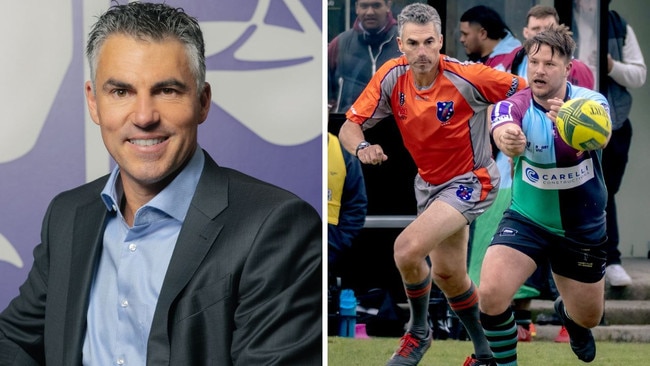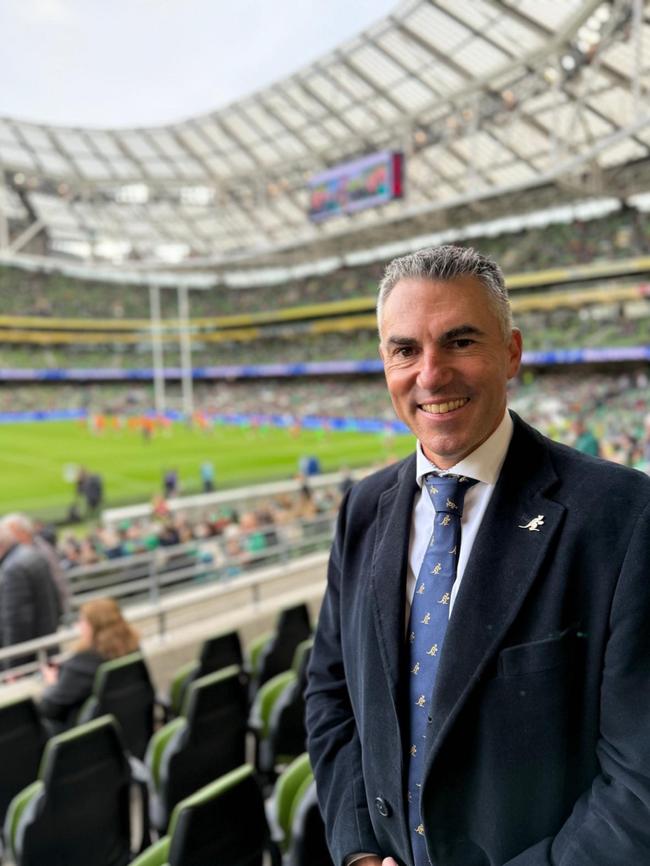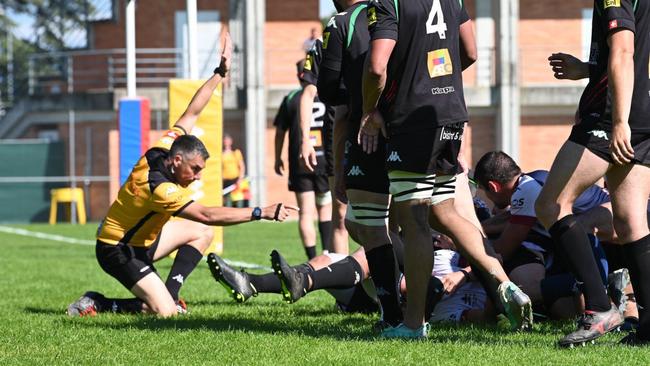Training secrets of super fit chocolate boss, Mondelez executive Darren O’Brien
Running, working with weights, a rowing machine and cross training are all part of the regime for Mondelez executive Darren O’Brien to follow his passion as a rugby union referee.

When Darren O’Brien was asked in 1985 by his school sports master at Sydney’s St Aloysius College to referee rugby union matches involving teams from the junior school, little did he know that it would ignite a lifelong passion.
“I’ve been number four and number five (the reserve referees) at Test matches and out on the ground with the match referee. You look around and there’s 60,000 people in the crowd, roaring. On those occasions I have always thought, ‘Gee, how cool would it be to actually be the person in the middle?’,” O’Brien says.
He was once asked to be a development officer with Australian Rugby Union, which would have put him on a path towards becoming a professional referee.
“The reality of it was, I think my wife would not have been happy because it would have been a very big difference in pay with what I am doing now,” he quips.
Instead, O’Brien chose a corporate career with global food behemoth Mondelez International, which started in 2008.
From 2016 to 2020 he was president of its multibillion-dollar European cheese and grocery business, based in Zurich, and for the past four years he has been Mondelez’s president for Australia, New Zealand and Japan, based in Melbourne.
It is no coincidence that O’Brien’s return to Australia saw one of Mondelez’s best-known brands, Cadbury, become the major sponsor for the national rugby union team, the Wallabies.
Just recently O’Brien was promoted to be the chief government and corporate affairs officer for Mondelez globally, based at the group’s head office in Chicago.
But he has not let his corporate career stop him from pursuing his passion for rugby refereeing.

He has now officiated in more than 300 senior competition games – including international matches – in Australia, New Zealand, France, Italy and Switzerland over the past 27 years.
In Melbourne, he has spent 20 seasons refereeing in the Dewar Shield, the premier amateur rugby competition in Victoria. In May 2023 he celebrated taking charge of his 150th match.
O’Brien has always held an interest in the psychology of refereeing, being able to – as he puts it – “flex your style” to communicate with different types of personalities on the field.
“That’s probably really where I started to get an interest in how similar some of the things you apply on a rugby field are to what you apply in business. The way that you are able to communicate with an intention to change behaviour and how you can use others to facilitate that,” he says.
“So there is a lot of the philosophy around people management and the use of captains to change behaviour, as opposed to just being a referee who’s punitive. Going from ‘I’m penalising that, or I’m not penalising that’ to actually asking ‘How do I tell the captain he’s responsible for these players? If they continue to infringe, I’ll have to escalate and get him to change their behaviour.’
“If you just apply one style to every situation you are not going to get the outcomes you can get if you have an understanding of what’s going to have the best impact, and you use that to sort of lead through others, because they are effectively then becoming your ally in getting things done.”
The now 54-year-old O’Brien’s fitness regimen to keep up his weekly refereeing duties has long been focused on interval running, especially up and down ramps and flights of stairs.
He always prefers morning sessions to the evening, giving him energy for the day ahead.
When he travels interstate or overseas, he loves distance running to see the sites of cities, usually following a river or a shoreline for navigation and, where appropriate, safety.
The Covid pandemic also saw him establish his own home gym with weights, a cross trainer and rowing machine.
“So during winter I tend to find myself doing more cross training and rowing and I try and do weights every second night. During summer, I find the outdoor running much more enjoyable,” he says, adding that he also has a pet dog “so my 15,000 steps every day is achieved pretty easily, partly because I start with 8000 or 9000 with the dog and everything after that becomes a bonus”.
O’Brien’s diet is protein focused, with plenty of fish, chicken and red meat, and fewer carbohydrates such as pasta and rice. Plenty of fruit and vegetables are also a high priority.
He also has his own routine for keeping tabs on his alcohol consumption.
“Someone once said to me, ‘If you have one day on alcohol and one day off, at least you’ve had alcohol-free days for half the year,” he quips.
“I also think that the harder you train, the less likely you are to want alcohol. If I come home after a hard day at work, before I make the decision that I’m going to have a drink, the first thing I’ll do is some exercise because I find at least half the time, I don’t feel like a drink anymore.”

O’Brien is also a keen skier. In January he is going heli-skiing in Canada, a thrillseeking pastime where a helicopter transports skiers to remote, untouched areas for downhill skiing.
He has grown to love skiing more and more as he has taken more senior executive positions in business. Most importantly, it has helped him focus the mind for the tasks at hand.
“It is not something where you can let your mind wander, especially when you go heli-skiing. If you let your mind wander you will find yourself having some significant downtime in the snow or worse,” he says.
“You are in the moment. You are always asking yourself “Where am I going? Where’s my next turn? What do I need to avoid?” I love the fact that you have got to be in the moment. You can have downtime on the chair lift heading up the mountain, but when you are actually on the slopes, you’ve got to be switched on.”





To join the conversation, please log in. Don't have an account? Register
Join the conversation, you are commenting as Logout